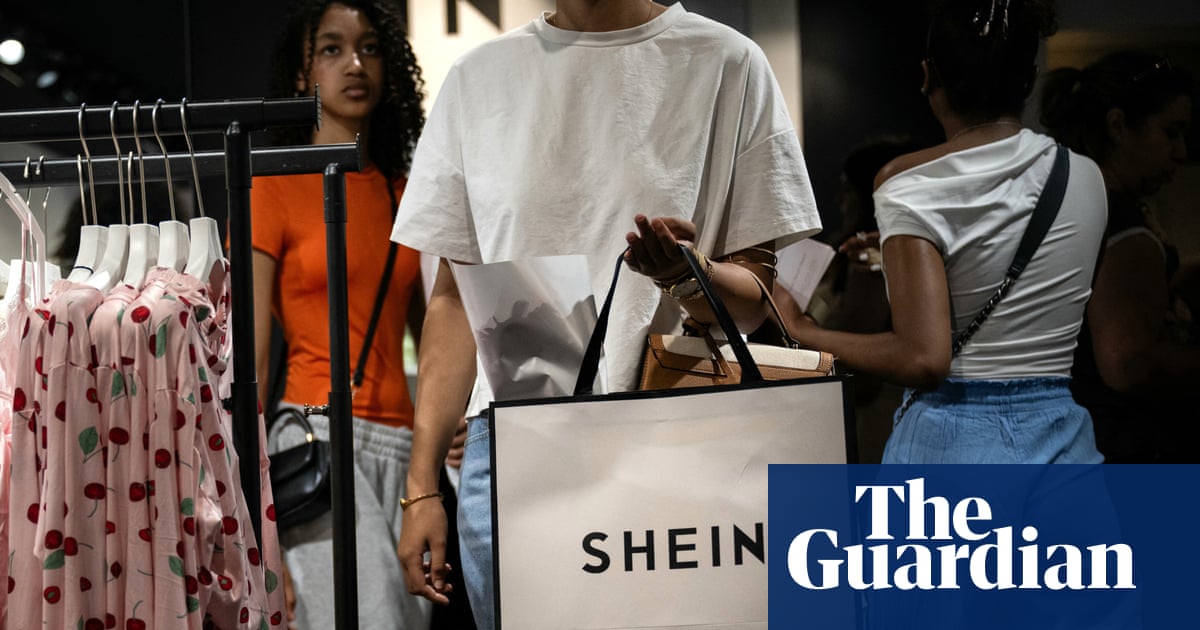Shein’s UK arm has been accused of transferring the “vast bulk of income” to its Singaporean parent in order to cut its British tax bill.
The company, which had been considering a £50bn float on the London Stock Exchange but is expected to list in Hong Kong, paid just £9.6m in corporation tax despite taking £2bn in sales last year.
The payment is equivalent to 25% of the £38.2m in pre-tax profits it made in the UK in 2024, according to accounts filed at Companies House, in line with the UK corporation tax rate.
However, campaigners said the bill was low relative to Shein’s £2bn sales because about 84% or £1.72bn of the sales figure is transferred to its parent group’s Roadget Business Pte Ltd in Singapore as a “purchasing” cost.
“Very little surplus is left in the UK to be subject to corporate income tax,” Paul Monaghan, the chief executive of the Fair Tax Foundation, said.
Referring to tactics adopted by Amazon, Apple and Microsoft to transfer earnings to low-tax countries which met heavy criticism more than decade ago, Monaghan said: “This feels like a new wild west for tax. The fast-fashion industry now is reminiscent of the worst excesses of big tech’s anti-tax measures in previous decades.
“Questions need to be asked as to how much of the economic value that Shein Distribution UK Ltd generates from its UK sales are actually being booked as profit in the UK and are subject to corporate income tax, and how much is being booked as profit in the tax haven Singapore.
“The UK accounts reveal substantial related party transactions with its immediate parent in Singapore, which transfer the vast bulk of income back to Singapore as a ‘purchasing cost’, leaving relatively little surplus in the UK to be taxed.
“Singapore not only operates a lower headline corporate income tax rate than the UK, 25% versus 17%, but also offers special incentives to attract corporates to establish there and these can see profits taxed at rates as low as 5%, and we know from previous Shein disclosures that Roadget Business Pte Ltd avails themselves of these.”
Accounts for the Singapore operation reveal it paid tax at an average rate of corporation tax of 9.4% in the three years from 2021 to the end of 2023, according to the Fair Tax Foundation.
A spokesperson for Shein said the allegations were “preposterously wrong and collapse under the most basic scrutiny”.
“As is standard in international commerce, our UK business purchases products for resale from our principal at prices consistent with prevailing market conditions and arm’s length principles, just as any independent third party would,” the spokesperson said.
“This approach ensures that our transactions are fair, reasonable, and in line with global practices. These are among the most fundamental and widely accepted practices in global commerce, something these campaigners should already understand.
“That we operate in a low-margin, high-volume industry should be obvious to anyone who has done even minimal research on our sector.
“Shein complies with the relevant laws and regulations of each market we operate in. We pay all relevant taxes in UK, where applicable.”
after newsletter promotion
The ultimate owner of Shein’s Singapore business is based in the Cayman Islands, a tax haven.
The spokesperson for Shein said: “This is a standard, widely used corporate structure across industries.”
The concerns about Shein’s low rate of corporation tax payments in the UK add to worries about its use of the de minimis rule, which allows overseas sellers to send goods valued at £135 or less direct to British shoppers without paying any customs duty.
Monaghan estimates that Shein would have paid as much as £200m of customs duty on importing its goods to the UK if it had not used the tax break.
The chancellor, Rachel Reeves, is reviewing the rule amid mounting fears that China’s retailers and manufacturers are dumping goods in the UK after the US in May revoked its own de minimis exception for Chinese-made goods, under which parcels with a value of less than $800 (£600) shipped to individuals were exempt from import tax. This week, the US also scrapped the tax break for items from all countries later this month.
The EU said in February it would phase out its exemption on customs duties for low-value parcels.
It emerged this week that £3bn worth of these parcels from China made up 51% of all the small parcels shipped to the UK from around the world last year.
That was up from 35% in 2023-24, according to HM Revenue and Customs figures obtained by the BBC via a freedom of information request.
